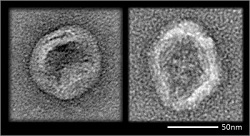 |
| A coated virus (left) as compared to the new coated nanoparticle (right)--Courtesy of Harvard's Wyss Institute |
Researchers at Harvard University's Wyss Institute have developed "smart" nanoparticles out of DNA that act like a virus to bypass the immune system's defenses and deliver drugs to a tumor.
Much like some other recent developments in drug delivery, this one makes use of a technique called DNA origami, which uses the genetic substance not for its ability to carry information but to form itself into easily manipulated shapes based on an engineer's needs. These can be used to develop simple cagelike structures or highly complex nanorobots with the ability to perform certain functions in the body.
In this particular case, the scientists mimicked a virus' phospholipid coating that helps it avoid detection by the immune system. By folding the DNA into a small octohedron and attaching lipids that eventually formed a membrane around the particle, the nanodevice resembled the virus, inheriting its cloaking mechanism, as well.
In mice, the coated nanoparticles remained in the bloodstream for hours, according to a report from the Wyss Institute, while uncoated particles were quickly broken down. And levels of the immune-activating molecules were more than 100 times less prevalent in mice treated with the coated nanodevices, the researchers reported on April 2 in ACS Nano.
"We're mimicking virus functionality to eventually build therapeutics that specifically target cells," senior author William Shih said in a statement.
- here's the Wyss Institute report
- and the research abstract